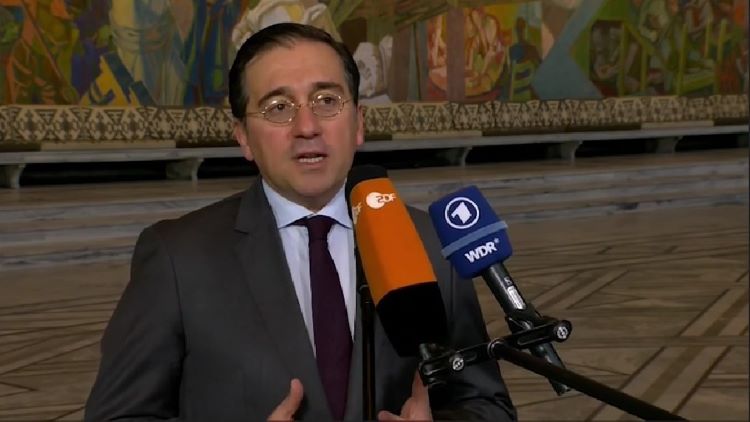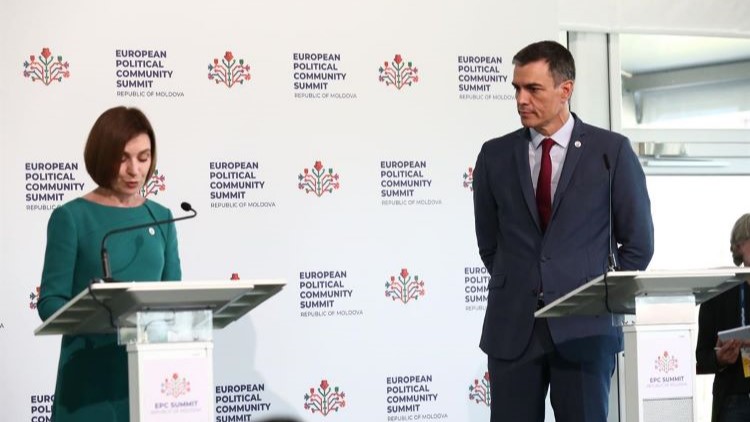The Diplomat
Foreign Minister José Manuel Albares yesterday responded to rumors about the possible appointment of Pedro Sánchez as NATO secretary general by assuring that he only sees him “as the next president of the Spanish government for the next four years”.
Albares made these statements to the press on the occasion of his participation in Oslo at the informal meeting of NATO foreign ministers in Oslo. At the meeting, according to the minister, Spain conveyed the need to “send a strong political message” of support to Ukraine “as long as necessary” and urged to “move forward on what was expressed and conveyed to Ukraine at the Bucharest meeting many years ago”, in reference to the Alliance Summit of 2008, in which Kyiv was promised its accession to NATO in an unspecified future. However, he admitted, “circumstances have changed and, therefore, our language, our attitude and our proposal to Ukraine has to be different”. Albares did not specify whether Spain would support the adoption of additional security measures for Ukraine, advocated by France and other countries.
During yesterday’s meeting, NATO Secretary General Jens Stoltenberg told a press conference, the foreign ministers focused “on how we can bring Ukraine closer to NATO” and discussed converting the current NATO-Ukraine Commission into a new NATO-Ukraine Council. “This would be an important step towards establishing a joint consultative forum with Ukraine, where we would sit at the table as equals to discuss key issues for our security,” Stoltenberg said. According to the secretary general, the door to NATO remains open and decisions on membership lie solely with the Allies and Ukraine. “We don’t know when the war will end, but we must make sure that, when it does, we have credible arrangements to ensure Ukraine’s security in the future and break Russia’s cycle of aggression,” he added.
Another of the main points contributed by Spain during the Oslo meeting, according to Albares, was the Government’s wish that the next Vilnius Summit “will be the definitive moment when Sweden can finally, as Spain wishes, be part of the family of democracies that we are NATO”. Likewise, the Foreign Minister urged the allies to address “the threats coming from the Southern Flank”, as was advanced “at the last Madrid Summit”, because “the threats from the South are, in addition, also the Russian threats from the South, and the hybrid threats, such as the coercive political use of energy flows or irregular migratory flows, can also come from the South”.
During the meeting with the press, Albares was asked – a few days after the call for early elections for July 23 – if he saw Sanchez as the next NATO secretary general. “I see Pedro Sánchez as the next president of the Spanish government for the next four years,” he declared. “I hope that all the progress that has been made, all the progress that has been made in Spain in recent years, does not stop,” because “an involution would not be good for Spain,” he added.
On April 5, Albares declared, during a working visit to Sweden, that Pedro Sánchez is not considering the possibility of succeeding Jens Stoltenberg as head of NATO and assured that “what can be expected is that the next legislature will be with President Sánchez as President of the Government, and any other scenario is a speculation that I would describe as completely crazy and that has no basis whatsoever”.
Likewise, the minister assured yesterday in Oslo that bringing forward the elections “will not affect in any way” the development of the Spanish Presidency of the Council of the EU, which will begin on July 1. “We have been working on this Presidency for a year and a half,” he declared. It is “a country project, in which all political forces have been included”, he added. Likewise, Albares assured that “there have been EU presidencies in all kinds of political circumstances” and recalled, in this regard, that during the French Presidency in 2022 there were presidential and parliamentary elections and that there have been European presidencies with governments in office and presidencies with governmental changes in the countries in office.







